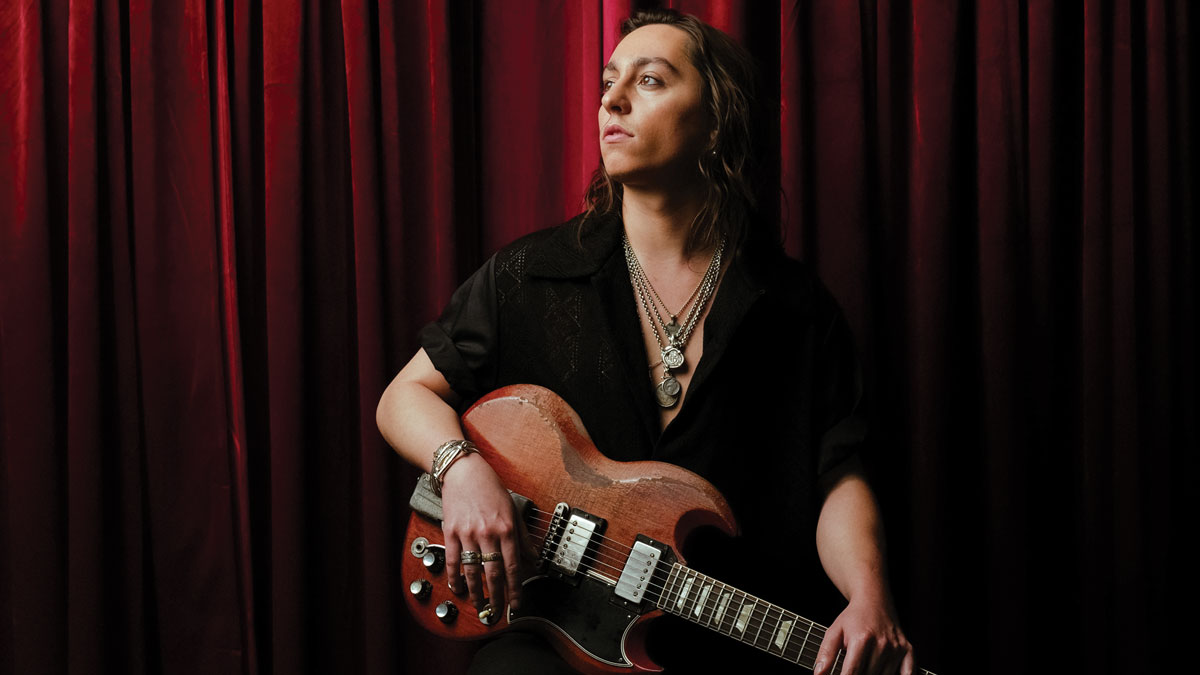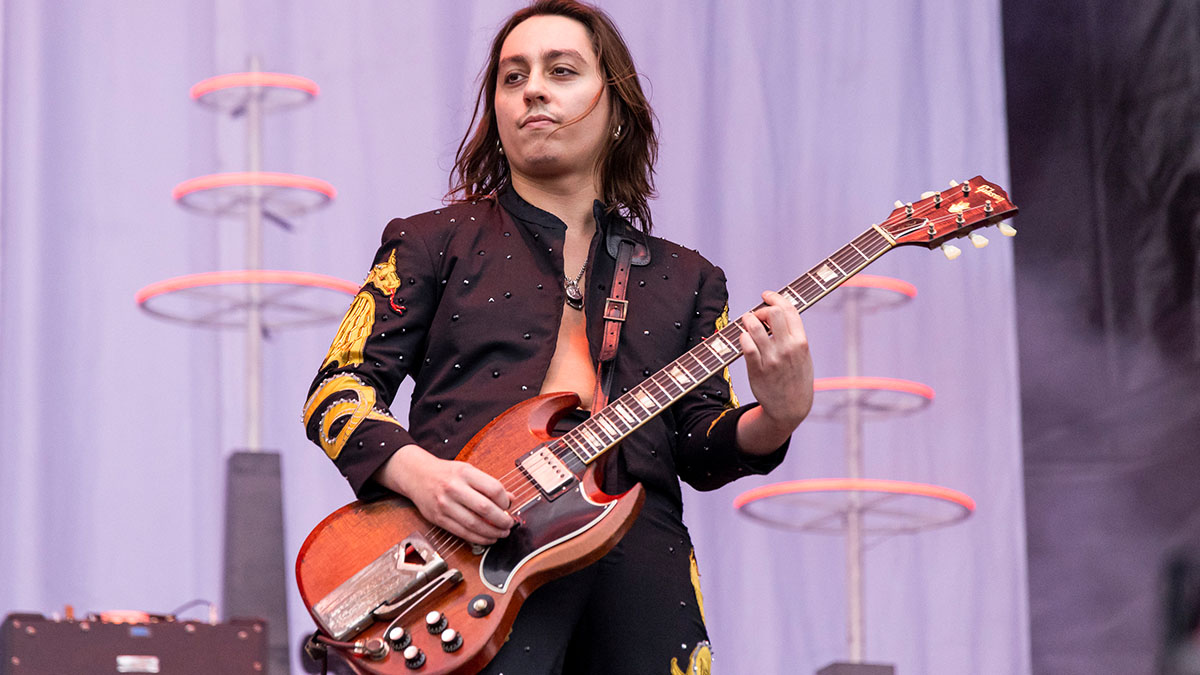
Kiszka was born to rock. And since strutting onto the scene back in 2017 with his band, Greta Van Fleet, he’s done just that. Of course, it hasn’t always been easy, considering the band is perpetually labeled as Led Zeppelin clones.
But no matter; throughout three stellar records, the Frankenmuth, Michigan rockers have kicked all preconceived notions square in the teeth, leaving gain-drenched trails of destruction in their wake.
As for Kiszka, he’s soft-spoken and unassuming. Upon dialing in with him, it was immediately apparent he’s not the sort of six-stringer worried about accolades and hyper-commercialism. No, Kiszka is the spiritual type who wields his trusty Gibson SG as a sacred talisman through which he channels otherworldly notes, gargantuan chords and chugging riffs.
And what of those Zeppelin comparisons? After years spent explaining himself, Kiska now happily straddles the line between wearing his influences like a badge of courage and being entirely unbothered. Of course, there are worse comparisons to be made, and if Greta Van Fleet’s latest, Starcatcher, is any indication, the band – and its swaggering guitarist – are intent on letting the music do the talking.
“We’ve gotten to a place in this band where we’re able to communicate our ideas freely and openly,” Kiszka says. “We don’t only feel the basic emotions of happiness and sadness; there are other things – like jealousy, spite, love, hate, anger and kindness. I think there’s a duality in blending those emotions, and we’ve done everything in our power to have that present in our music.”
Before all the hubbub surrounding the “New Wave of Classic Rock” began to cascade down upon the masses, Greta Van Fleet were just another band of hopefuls. But it didn’t take long for their dreams to become a reality, as Greta Van Fleet’s two 2017 EPs, Black Smoke Rising and From the Fires, raged forth like a shutter shock sent from the heavens. From that point forward, there was no denying that a new, yet somehow old, era of rock music was upon us.
Now, six years later, Greta Van Fleet continue to ride an unforeseen wave of fanfare and acclaim that’s yet to break upon the shore entirely. In 2018 and 2021, two more records came forth – and conquered – in the form of Anthem of the Peaceful Army and The Battle at Garden’s Gate. Still, comparisons to bands of old dogged Greta Van Fleet, but never enough to impact their fortunes or deter an undying cult fanbase.
And so, here we are in 2023 on the precipice of Greta Van Fleet’s latest and greatest, Starcatcher. It would be all too easy to assume that the sounds herein are merely shadows of the past; and sure, in some ways, they are. But isn’t that the case with all rock music to some degree? Regardless, Kiszka and company have heard the calls and have risen to the challenge of crafting perhaps their most intriguing record yet.
When asked about the balancing act between stylistic evolution and the status quo, Kiszka ponders a bit before saying, “We have a lot of influences, and those influences have the potential to take us in different directions musically. We allowed ourselves to be free and chase some of that, which was really important for us. I feel this record is powerful in ways that our others aren’t. And I feel that the dynamic within the band offers everybody within it something, which allows us to offer our audience something.”
Some 10 years after their formation, and six years after the dueling EPs that shook the world, Greta Van Fleet have seen their music appear across countless movie, television and videogame soundtracks. For a group still so young, there’s no denying they’ve become a perpetual back of the zeitgeist in the form of a rock ’n’ roll backdrop. But if you were to ask Kiszka, his band hasn’t reached its apex. Not even close.
“We’re always chasing something,” Kiszka says. “If you’re not chasing something, what’s the point of being creative? So we don’t settle or compromise. We follow our hearts and go in with the mindset that the sky’s the limit. And when we’re writing a song, it always comes from the heart, no matter the motif or whatever is going on.
“We never think, ‘Okay, we want to write this or that.’ And we’ve never looked at it like, ‘We’re gonna write a hit for this thing or this reason.’ We’ve never cared about making music for radio or competing with other bands. It’s strictly about following the hand that guides.”

In support of Starcatcher, Kiszka dialed in with Guitar World to discuss Greta Van Fleet’s continued evolution, the addition of some tasty new pedals into his mix, incorporating the blues, his love for Gibson SGs and the unique dynamic of sharing space in a band with family.
How have Greta Van Fleet evolved for Starcatcher?
“A lot of this record has been about going back to our roots. At least, that’s certainly been the case for me. Foundationally, many of our influences go back to the blues and things like that. I needed to get back to the basics of players like Lightnin’ Hopkins, Elmore James, Robert Johnson, Lead Belly, Muddy Waters and Albert King.
“So I think Starcatcher is very foundational in ways that maybe our previous records weren’t. I think we’ve gone in directions I’d call 'cinematic,' and I think the mindset this time was, 'Let’s dial it back, get out of the city, go back into the country and put some of those types of songs together.' The result is what I’d say is a pretty heavy record.”
I can’t help but notice Starcatcher’s primal nature. Was it your intention to go in a more rhythmic direction?
“Yeah, you’re right. If you listen, there are tons of primitive aspects that are undeniably human, powerful and visceral. I think we went in wanting to elicit those types of sounds. And, again, that’s us harkening back to our blues influences. It’s a genuine evolution of all the sounds that brought us here.
“Kind of like those that came before us, this is us staking our claim to our contribution to our generation. It’s a love letter to the echoes of the power of rock music, which I think the world always needs more of. [Laughs]”
How did those influences directly impact your approach?
“I think my sound is pretty well established, so it was important for me to venture into territories I’ve never explored. I began experimenting with alternative tunings, using a B-bender, playing in open C and all sorts of new pedals.
“I hadn’t taken that journey before; conceptually, these were things I’d never done. So I allowed myself to dive into that world, which led to a very open-ended approach. I think that was important because the guitar sounds were pretty ambient on our last record [The Battle at Garden’s Gate]. This time, I wanted to try and have the guitars be more full-frontal and in your face.”
Tell me about some of those pedals and the amps you paired them with.
“For amps, I’ve been using this Marshall Astoria, which is a Chicago Music Exchange exclusive. And with the pedals, I guess I’m kind of a purist, so I didn’t get too much into the boutique stuff. I went with an Electro-Harmonix Holy Grail reverb, which did a lot of heavy lifting.
“I’ve gotten into using a wet/dry system at this point, and I’ve also been using a lot of stereo effects, like slap delays and phasers. I was able to convert my wah-wah pedal with the help of my guitar tech to where if I’ve got my toe or heel on it, it pans back and forth, giving me a huge, wide dynamic range.”
I’ve always loved Gibson SGs because many of the guys I grew up listening to played them. Seeing those British Invasion guys up there playing an SG made me want to be that guy
Did your SGs (and SG-shaped ’61 Les Paul) play a big part on this record?
“I’ve always loved Gibson SGs because many of the guys I grew up listening to played them. Seeing those British Invasion guys up there playing an SG made me want to be that guy. I knew that it was what I wanted to do. I wanted to be the guy to get up there and evoke emotion, and Gibson guitars have always been a great vehicle for me to do that.
“They’re dynamic guitars; you can do so much with them depending on the pickups, amps, et cetera. So, my Gibson definitely played a big part in this record, as it helped me bring out the thunder and lightning. With an SG, I can let out my visceral, animalistic side as a player. Honestly, that’s difficult for me to attain with anything else.”
I’m sure the SG was essential for your leads, but did you deploy any new guitars while tracking your rhythm parts?
“My SG is my number one. I love that guitar, and we’ve done a lot together. So that’s usually my main paintbrush while I’m in the studio. But I’m open to other guitars and use them as I need to.
“I’ll be honest: I’m sure there are tons of different guitars on this record in small doses. But I’d have to go back into the engineer’s logbook to try and tease them all out. I know that I used an ES-335, and I also broke out this old budget Telecaster. And there were some spots where I used a baritone guitar, so there’s an assortment.
“I guess I don’t always pay attention to those sorts of details; I’m more about creating textures while painting, so to speak. But I love how you can layer guitars and make profoundly complex and outrageous sounds. Of course, that’s always tough to recreate live. [Laughs]”
Do you chase sounds or let the riffs and licks come to you?
“That’s an interesting question. I think maybe a lot of players do chase sounds, but I don’t really go about it that way. I’ve always had a classic sound but never pursued that. I think subconsciously, a lot of that has been driven deep within my DNA as a guitar player. That said, there are certain sounds that I’m trying to achieve, but I’m not necessarily trying to emulate something that has been done before.”
You mentioned the blues earlier. How is that most present on this record?
“You can hear the blues in my playing on this record more than any of our others. Having said that, Elmore James has always been huge for me. His slide playing is one of the things that has always influenced me.
“But beyond his slide playing, I think it’s most present in my attitude and mood. The truth is I’ve never heard anyone play guitar like Elmore James, and I don’t think anyone ever will again. He was the only one to do it that way, so I’m trying to sound like him. But I did work to try and capture the attitude he had.”

Did the success of Greta Van Fleet’s early EPs take you by surprise? Have you felt boxed in by that success since?
“It kind of did because I don’t think that was ever prevalent in our minds. We were just trying to offer something our generation hadn’t yet covered. From our perspective, this music was something we felt the world needed more of. Music had stepped away from it for so long in terms of new bands, and for us, it was authentic and organic to steer things back that way.
“It’s what we came from, and it’s real for us. We never imagined it would take off; we were trying to write the best songs and play with as much intensity as possible. But you’re right; we were right there at the beginning to kick things off for our generation. But I don’t think we’ve ever felt boxed in; we’ve always been intent on creating music that moves us and the fans.”
What challenges came about from being thrust into the spotlight so quickly?
“We could feel it early on that something was going on. We’d play these shows, and there was just so much electricity in the air around us. I remember being on stage early on and feeling the hair stand up on the back of my neck.
“Before we knew it, more and more bands were getting involved, which is great. But as far as challenges, this is exactly what we wanted. We had objectives in mind, and for us, the sky has always been the limit.”
In any band – especially one you share with family – there’s always gonna be some bloodshed
Brothers sharing space in a rock ’n’ roll band has ended in disaster for many before you, but Greta Van Fleet has thrived. Why?
“We do seem to be doing alright. [Laughs] But, man, you’re right; the list of family bands that have shredded themselves to the point of self-implosion is pretty extensive. But I guess the secret is we’re good to each other. We try not to get aggressive, and we give each other space if we need it. And honestly, a lot of that stuff that could have hurt us; we got most of it out early on.
“Sure, we’d get together to play or rehearse, and sometimes things would happen where someone throws a chair across a room or a door gets broken down, but we learned how to navigate all that.
“In any band – especially one you share with family – there’s always gonna be some bloodshed. And we get into those arguments, have creative differences and all of that, but we’ve always let the passion we share guide us rather than whatever momentary thing stands in our way.
How will Starcatcher allow Greta Van Fleet to further their connection with their audience?
“We love all the records we’ve put out, but Starcatcher, in particular, sounds absolutely gigantic. I can’t wait to get out and perform these songs live. As we’ve been rehearsing them, we’re seeing more and more just how dynamic and full of dimension they are.
“I think that will allow us to be more informative as performers because these songs are very direct; that will enable us to form an interesting connection with the audience. I think it will allow us to tell more stories through the music. Our goal is always to inspire emotion, and these songs are truly more powerful than anything we’ve ever written.”
You’ve had a lot of success with songs like Highway Tune, but you don’t strike me as someone who cares too much about that sort of thing.
“You’re right about that. We appreciate our success, but none of the commercial stuff ever enters my mind. It’s funny because a lot of groups will write specifically for radio, or they’ll have a particular commercial objective, and they chase that intent, you know? But we’ve always come from a deeply instinctual place.
“When I’m putting a song together, there’s always something beyond what I can see or touch that’s guiding my hands to do whatever I’m doing. I see myself as a courier, and whatever comes from it, that’s cool by me.”
- Starcatcher is out now via Lava Music.







